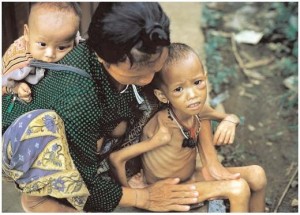State of Food Insecurity in Pakistan
Thursday, October 20th, 2011 2:22:33 by Momina Khan
State of Food Insecurity in Pakistan
The world economic recession over the past years and continued political tensions in recent weeks have exacerbated Pakistan’s national economy as well obscured the path of social development.
The burden of overdue expenditure on military operations to contain militancy in the country has also hindered social development. This developing humanitarian crisis is aggravating Pakistan’s already-widespread food insecurity. According to 2010 data from the World Food Program, 77 million Pakistanis—nearly half the country’s total population—are food insecure, while 95 of Pakistan’s 121 districts face problems such as hunger and malnutrition-related disease. Last year, a UNICEF report concluded that half of all child deaths in Pakistan can be attributed to poor nutrition.
Zafar Altaf of the Pakistan Agricultural Research Council pointed out key obstacles to improving Pakistan’s food security, including a disproportionate emphasis on wheat, inefficiencies of fertilizer and irrigation systems, poor infrastructure in the western provinces, and a lack of innovative knowledge generation. He emphasized the importance of improving both socio-economic conditions and the quality of research institutions.
Such improvements are needed in order to break the cycle of sub-optimal policies and to produce imaginative solutions. The single most beneficial initiative towards strengthening food security in Pakistan would be to bring Baluchistan’s currently uncultivable but abundantly available land into use.
Pakistan’s food security is tied to the production and availability of wheat, which accounts for more than 55 percent of the country’s total caloric consumption. The availability of, and access to, wheat is a story of regional disparities. For example, the volatile Khyber Pukhtoonkhuwa (KPK) suffers from huge shortfalls in wheat, while the fertile eastern province of Punjab enjoys a surplus. Wheat producers’ benefit disproportionately from Islamabad’s subsidizing of the wheat industry. One needs to advocate for a middle ground between protecting consumers and subsidizing producers.
We also need to understand that food insecurity is not just the result of poor agricultural production, but also a byproduct of structural factors such as unequal land distribution. Land is Pakistan’s single-most important asset—yet millions of Pakistanis are landless. ‘Broad-based’ and not simply ‘cosmetic’ land reforms are essential for strengthening food security and reducing poverty. Food is a basic right, and therefore should be thought of not in terms of availability and access, but instead in terms of entitlement and justice.
Article 38 of Pakistan’s constitution stipulates that the state shall provide basic necessities such as food. However, in reality, Islamabad’s record in providing such services has been abysmal in recent years. A big part of the problem has been the country’s worsening violence. All seven agencies of the unstable Federally Administered Tribal Areas are found to be extremely food insecure, while the districts in KPK and Baluchistan have alarming amounts of violence. Due to the country’s violent environment, Pakistanis at times must literally harvest crops under the gun.
High prevalence of food insecurity has intensified extraordinary behavior, giving rise to suicides, suicide attacks, and the selling of children, and hastening the loss of dignity. To address this crisis, we need a paradigm shift in public spending that moves away from national defense and towards social development, and that benefits the individual, not the state.
The World Food Program’s Allan Jury once stated hunger is “the curse that keeps on giving” – hungry people stop investing in education and health care, which adversely impacts their economic situation and leads to yet more social issues. Food security must be handled through a lifecycle approach, emphasizing bottom-up rather than top-down solutions.
The World Food Programme, for instance, has had considerable success in providing food at schools and offering take-home rations, in some cases only for girls. This serves to encourage low-income families to send their female children to school. Food insecurity and poor governance are inextricably linked. Pakistan will never be food secure until it provides its citizenry with good governance.
Last but not the least, it is imperative that government, civil society and other institutions formulate a policy to bring down the ratio of food insecure masses in the country and take the country on the path of progress by redressing the grievances of poor people.
Short URL: https://www.newspakistan.pk/?p=807

















